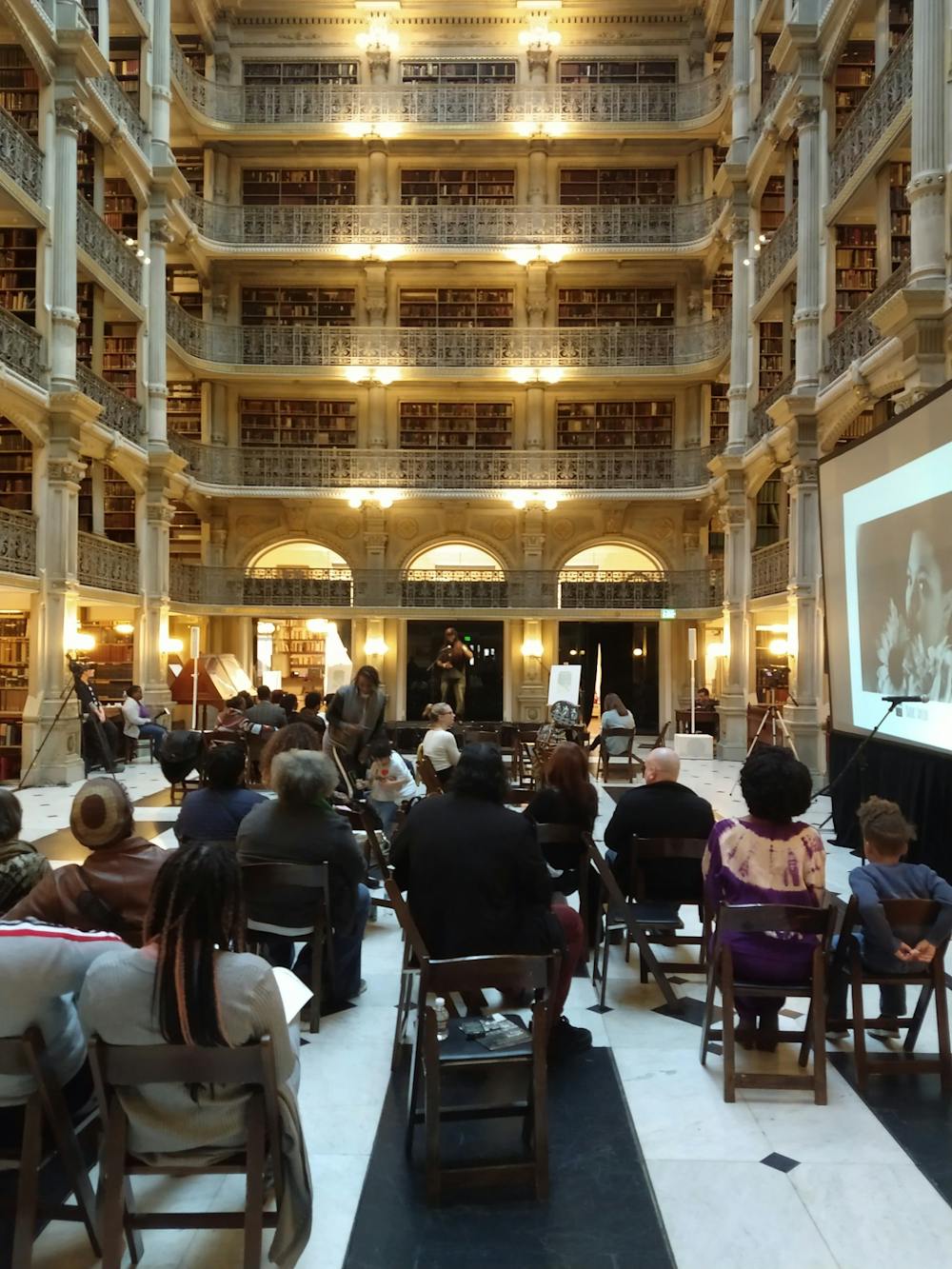The George Peabody Library held a City of Neighborhoods celebration on Sunday as part of the closing week of the exhibition of City People: Black Baltimore in the Photographs of John Clark Mayden, an exhibition of Mayden’s photos. The event involved a variety of activities encouraging Baltimore residents to share their experiences of the city, interact with past figures who inhabited it and highlight diverse, artistic voices in the city while focusing the ideas of community and home through the specific realities of Baltimore.
The day began with a series of activities for visitors that allowed them to discuss their personal experiences and relationships that defined their lives in Baltimore as well as explore the experiences of past residents of the city. For example, there were posters where visitors wrote about or drew their favorite places or memorable experiences, as well as maps of Baltimore filled with stickers representing where these people had lived, worked or simply had a good time in the city.
There were also exhibits with voice recordings of previous residents representing how the city was experienced in the past and how that experience had changed. Another activity highlighted the life of one of the city’s most famous residents — Frederick Douglass. It was poignant, yet haunting, to see for myself the maps from antebellum Baltimore which showed the same world that he used to inhabit and the ledgers from the same period that also described the Aulds, the slave owners Douglass was sent to live with.
This theme of allowing for person-to-person communication while highlighting some distinct voices continued with the next event: performances and an open mic. It started with multiple artists sharing stories and poetry related to the idea of home. One of the highlights was a story by David Fakunle, who spoke about how there is great power in acknowledging one’s home.
“My wife, she never wanted to return back to her home in Sinaloa, because she said she hadn’t been there since she was a kid and nobody would remember her… but after going one time, I can see that she’s now an entirely different person… I see it in her eyes, but most of all, I see it because she can’t stop talking about it,” he said.
After opening up the mic to residents, a series of personal testimonies on the city followed; people spoke about how home to them was not just their immediate surroundings but the city itself. From the National Great Blacks in Wax Museum, to Panda Express and the Charmery, each person described the ethereal qualities of belonging and community, whether at that moment or forever, that made them a part of their home.
At the same time, home could just as easily mean the opposite. One speaker recited a poem about the exclusion and oppression that many residents felt due to the violence in Baltimore.
In the next event of the evening, poet Kondwani Fidel dealt with these issues of exclusion through his 2018 documentary Hummingbirds in The Trenches. It was essentially a dramatization of his poem of the same name, but it was also interpolated with interviews with him.
The documentary highlighted how Fidel’s home shaped who he is – both the good and the bad. As mentioned in the documentary, “Resilience was ingrained in you, growing up in Baltimore.” But that resilience only arose because his parents were both struggling with drug abuse and because of the death of his seven-year-old brother. He also spoke about how his growth meant seeing how life did not need to be defined by these situations when he travelled outside Baltimore. Rather, his true growth came in acknowledging the problems and staying in the city to try to fix them.
One of the lines in the documentary, and one which Fidel later touched on, was one which addressed these issues in a particularly incisive way.
“If you ain’t telling your story you’re giving society the space to kill you,” Fidel said.
In many ways, that statement was a defining phrase for the entire event: an event highlighting that one of the ways to change society is simply by acknowledging its existence, whether it be through poetry, personal testimonies or photography.
The exhibit will continue to be in the Peabody library until Mar. 1. I would highly recommend visiting it and seeing the city through the varied perspectives of its residents.





